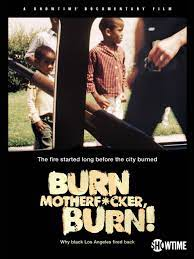Saturday 30 April 2022
Something Cult, Foreign-Language or Indie #297: Burn, Motherfucker, Burn! (2017)
Something Cult, Foreign-Language or Indie #296: Biography: I Want My MTV (2019).
Saturday 16 April 2022
Something Cult, Foreign-Language or Indie #295: The Mafia Kills Only in Summer (2013).
This Italian critical darling began really so well for me, with its unusual but genuinely charming mix of The Wonder Years, Amelie, Goodfellas and Good Bye, Lenin!. The first half with child Arturo mixes the respective nostalgia and narration, romantic whimsy, mafia theme and political subtext of those four classics. But then it jumps forward to adult Arturu now working as a journalist and still in love with Flora, and I can understand and appreciate how that creative choice was taken for a narrative arc and variety but that's where the film's consistency really dropped for me. The childhood scenes are sweeter than a gelato (and you know I've made that reference because this is an Italian movie) and the adulthood ones, in fairness, abandon that for realism to show the contrasts between those life stages, but I just found the transition quite jarring and the outcome increasingly bland. I think Dilberto should've added some subtle visual or thematic connections in the latter scenes to the events in Arturo's and Flora's childhoods. Not to mention more emphasis in the cinematography, particularly, on the Mediterranean landscape nearby, and in a few scenes Roberto Forza's score I found rather intrusive.
Friday 15 April 2022
Something Cult, Foreign-Language or Indie #294: Hotel Artemis (2019).
Wednesday 13 April 2022
Something Cult, Foreign-Language or Indie #293: Only the Animals (2019).
One or two scenes may be just slightly too long, but Only the Animals nonetheless is a refreshing departure for European thrillers. 8/10.
Sunday 10 April 2022
Something Cult, Foreign-Language or Indie #292: Weathering with You (2019).
If you read this and you're about to watch the movie, that's my forecast for what you'll get with Weathering with You. 6/10.
Friday 8 April 2022
Something Cult, Foreign-Language or Indie #291: The Emperor's Club (2002).
Based on Ethan Canin's 1994 short story The Palace Thief, The Emperor's Club is harmless but unremarkable. That's because despite Kline's solid lead performance and the presence of a few newbies who've since gone on to A-list Hollywood status (there's also a young Jesse Eisenberg here), this narrative makes absolutely no effort to explore ignored avenues or to bravely throw the big emotional punches. Both of those intentions are very risky, as both can make the book/film etc. seem like it's trying too hard to be respectively unconventional or powerful. (What makes all the difference is how the director treads the chosen territory.) But trying to take either of those routes and falling into the respective traps is, I think, preferable in some ways than shying away from said routes altogether. Instead, director Michael Hoffman and screenwriter Neil Tolkin take a quite stuffy approach to this school-based coming of age flick and while I had feeling at the start that this would be emotional overkill and it turns out I was wrong there, I still wasn't engaged, moved or inspired.
Friday 1 April 2022
On THAT slap.
Everybody saw it. Literally the entire world; the amount with TV or internet access anyhow. What the hell was Will Smith thinking - if he was thinking at all? You were at the Academy Awards, dude! The world's highest-profile awards show! Plus, you were about to mark a career peak with the Best Actor Oscar!
I don't know. But I do know what happened around me when I saw it. I was watching the show with a friend and, in the moment, I thought Will's intentions, at least, were understandable, but my friend was outraged. Personally, I still don't think he should've gone up there and hit Chris Rock, but I do think doing that was just foolish, and it has overshadowed the achievements of the other winners, namely the queer and Latino Ariana DeBose and the deaf Troy Kotsur. I also knew when it happened that it would be an instant media - news and social - whipping horse, and there I was right. Plus, what was keeping Smith from saving those feelings for his acceptance speech since he must've known he was his category's warm favourite?
Furthermore, he was laughing himself at Rock's joke that sparked it all, until he saw wife Jada's upset reaction. That was evidently what tipped the scales, but it didn't make his initial reaction any less hypocritical and then in his speech itself, he advocated for peace and harmony. Rock's joke also was sexist and body-shaming, but it was just a joke and it was meant to provoke, so by lashing out like he did, Smith gave Rock that very satisfaction. I also think somebody seated near Smith should've tried to restrain or calm him before he walked on stage; they must've known, from his yelling, how angry he was.
In fairness, Smith did apologise during his speech and, at greater length, in a statement after the show. But now, after the Academy announced an investigation into this incident and possible disciplinary action against him (including stripping him of his Oscar), he has resigned from their membership. I call that cowardly jumping before you can be pushed. I'm still prepared to give him a second chance; too many celebrities have been punished more for equal or greater sins. But Will would be very wise to avoid a repeat of this entire very public scandal.






